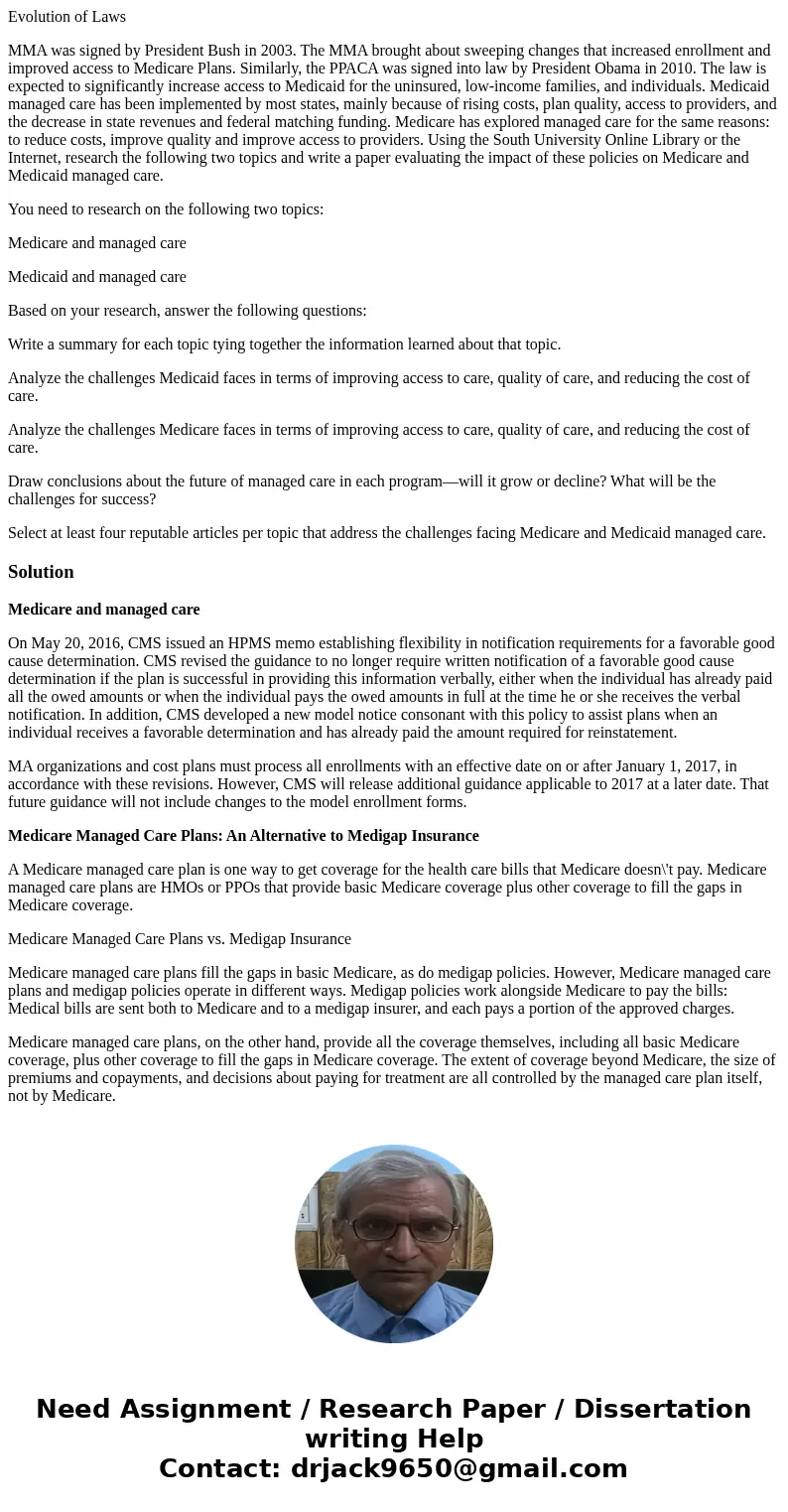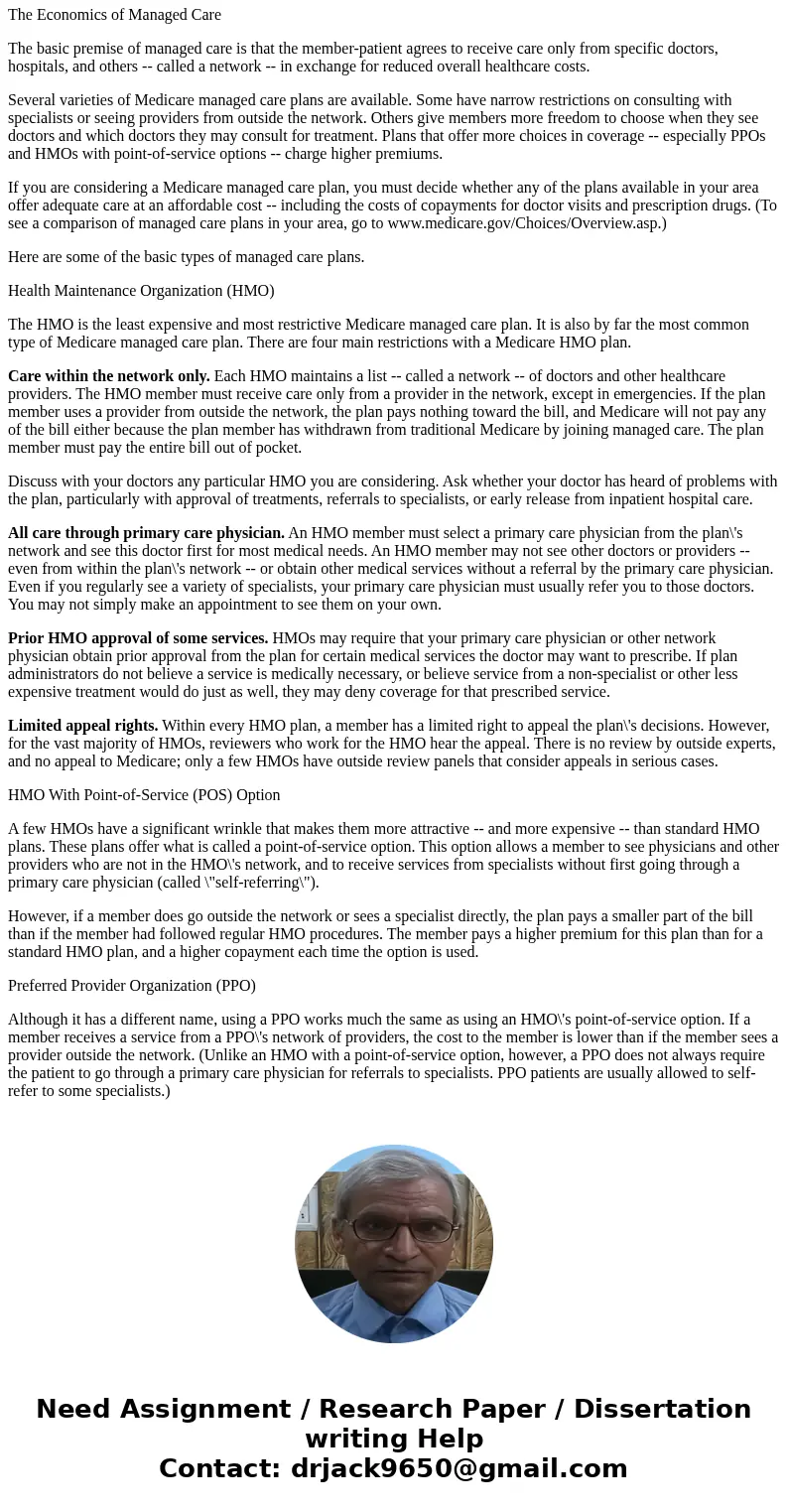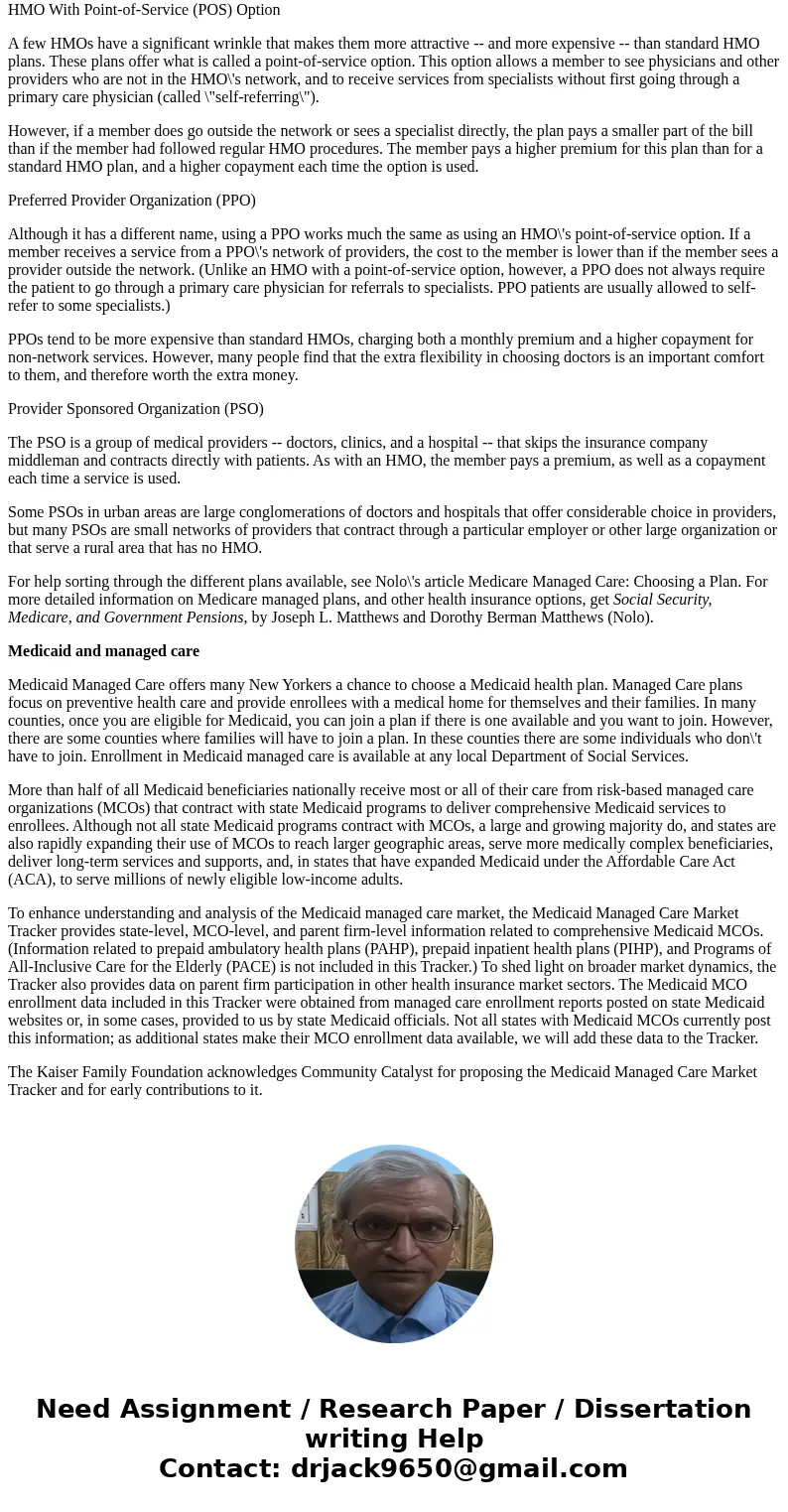Evolution of Laws MMA was signed by President Bush in 2003 T
Evolution of Laws
MMA was signed by President Bush in 2003. The MMA brought about sweeping changes that increased enrollment and improved access to Medicare Plans. Similarly, the PPACA was signed into law by President Obama in 2010. The law is expected to significantly increase access to Medicaid for the uninsured, low-income families, and individuals. Medicaid managed care has been implemented by most states, mainly because of rising costs, plan quality, access to providers, and the decrease in state revenues and federal matching funding. Medicare has explored managed care for the same reasons: to reduce costs, improve quality and improve access to providers. Using the South University Online Library or the Internet, research the following two topics and write a paper evaluating the impact of these policies on Medicare and Medicaid managed care.
You need to research on the following two topics:
Medicare and managed care
Medicaid and managed care
Based on your research, answer the following questions:
Write a summary for each topic tying together the information learned about that topic.
Analyze the challenges Medicaid faces in terms of improving access to care, quality of care, and reducing the cost of care.
Analyze the challenges Medicare faces in terms of improving access to care, quality of care, and reducing the cost of care.
Draw conclusions about the future of managed care in each program—will it grow or decline? What will be the challenges for success?
Select at least four reputable articles per topic that address the challenges facing Medicare and Medicaid managed care.
Solution
Medicare and managed care
On May 20, 2016, CMS issued an HPMS memo establishing flexibility in notification requirements for a favorable good cause determination. CMS revised the guidance to no longer require written notification of a favorable good cause determination if the plan is successful in providing this information verbally, either when the individual has already paid all the owed amounts or when the individual pays the owed amounts in full at the time he or she receives the verbal notification. In addition, CMS developed a new model notice consonant with this policy to assist plans when an individual receives a favorable determination and has already paid the amount required for reinstatement.
MA organizations and cost plans must process all enrollments with an effective date on or after January 1, 2017, in accordance with these revisions. However, CMS will release additional guidance applicable to 2017 at a later date. That future guidance will not include changes to the model enrollment forms.
Medicare Managed Care Plans: An Alternative to Medigap Insurance
A Medicare managed care plan is one way to get coverage for the health care bills that Medicare doesn\'t pay. Medicare managed care plans are HMOs or PPOs that provide basic Medicare coverage plus other coverage to fill the gaps in Medicare coverage.
Medicare Managed Care Plans vs. Medigap Insurance
Medicare managed care plans fill the gaps in basic Medicare, as do medigap policies. However, Medicare managed care plans and medigap policies operate in different ways. Medigap policies work alongside Medicare to pay the bills: Medical bills are sent both to Medicare and to a medigap insurer, and each pays a portion of the approved charges.
Medicare managed care plans, on the other hand, provide all the coverage themselves, including all basic Medicare coverage, plus other coverage to fill the gaps in Medicare coverage. The extent of coverage beyond Medicare, the size of premiums and copayments, and decisions about paying for treatment are all controlled by the managed care plan itself, not by Medicare.
The Economics of Managed Care
The basic premise of managed care is that the member-patient agrees to receive care only from specific doctors, hospitals, and others -- called a network -- in exchange for reduced overall healthcare costs.
Several varieties of Medicare managed care plans are available. Some have narrow restrictions on consulting with specialists or seeing providers from outside the network. Others give members more freedom to choose when they see doctors and which doctors they may consult for treatment. Plans that offer more choices in coverage -- especially PPOs and HMOs with point-of-service options -- charge higher premiums.
If you are considering a Medicare managed care plan, you must decide whether any of the plans available in your area offer adequate care at an affordable cost -- including the costs of copayments for doctor visits and prescription drugs. (To see a comparison of managed care plans in your area, go to www.medicare.gov/Choices/Overview.asp.)
Here are some of the basic types of managed care plans.
Health Maintenance Organization (HMO)
The HMO is the least expensive and most restrictive Medicare managed care plan. It is also by far the most common type of Medicare managed care plan. There are four main restrictions with a Medicare HMO plan.
Care within the network only. Each HMO maintains a list -- called a network -- of doctors and other healthcare providers. The HMO member must receive care only from a provider in the network, except in emergencies. If the plan member uses a provider from outside the network, the plan pays nothing toward the bill, and Medicare will not pay any of the bill either because the plan member has withdrawn from traditional Medicare by joining managed care. The plan member must pay the entire bill out of pocket.
Discuss with your doctors any particular HMO you are considering. Ask whether your doctor has heard of problems with the plan, particularly with approval of treatments, referrals to specialists, or early release from inpatient hospital care.
All care through primary care physician. An HMO member must select a primary care physician from the plan\'s network and see this doctor first for most medical needs. An HMO member may not see other doctors or providers -- even from within the plan\'s network -- or obtain other medical services without a referral by the primary care physician. Even if you regularly see a variety of specialists, your primary care physician must usually refer you to those doctors. You may not simply make an appointment to see them on your own.
Prior HMO approval of some services. HMOs may require that your primary care physician or other network physician obtain prior approval from the plan for certain medical services the doctor may want to prescribe. If plan administrators do not believe a service is medically necessary, or believe service from a non-specialist or other less expensive treatment would do just as well, they may deny coverage for that prescribed service.
Limited appeal rights. Within every HMO plan, a member has a limited right to appeal the plan\'s decisions. However, for the vast majority of HMOs, reviewers who work for the HMO hear the appeal. There is no review by outside experts, and no appeal to Medicare; only a few HMOs have outside review panels that consider appeals in serious cases.
HMO With Point-of-Service (POS) Option
A few HMOs have a significant wrinkle that makes them more attractive -- and more expensive -- than standard HMO plans. These plans offer what is called a point-of-service option. This option allows a member to see physicians and other providers who are not in the HMO\'s network, and to receive services from specialists without first going through a primary care physician (called \"self-referring\").
However, if a member does go outside the network or sees a specialist directly, the plan pays a smaller part of the bill than if the member had followed regular HMO procedures. The member pays a higher premium for this plan than for a standard HMO plan, and a higher copayment each time the option is used.
Preferred Provider Organization (PPO)
Although it has a different name, using a PPO works much the same as using an HMO\'s point-of-service option. If a member receives a service from a PPO\'s network of providers, the cost to the member is lower than if the member sees a provider outside the network. (Unlike an HMO with a point-of-service option, however, a PPO does not always require the patient to go through a primary care physician for referrals to specialists. PPO patients are usually allowed to self-refer to some specialists.)
PPOs tend to be more expensive than standard HMOs, charging both a monthly premium and a higher copayment for non-network services. However, many people find that the extra flexibility in choosing doctors is an important comfort to them, and therefore worth the extra money.
Provider Sponsored Organization (PSO)
The PSO is a group of medical providers -- doctors, clinics, and a hospital -- that skips the insurance company middleman and contracts directly with patients. As with an HMO, the member pays a premium, as well as a copayment each time a service is used.
Some PSOs in urban areas are large conglomerations of doctors and hospitals that offer considerable choice in providers, but many PSOs are small networks of providers that contract through a particular employer or other large organization or that serve a rural area that has no HMO.
For help sorting through the different plans available, see Nolo\'s article Medicare Managed Care: Choosing a Plan. For more detailed information on Medicare managed plans, and other health insurance options, get Social Security, Medicare, and Government Pensions, by Joseph L. Matthews and Dorothy Berman Matthews (Nolo).
Medicaid and managed care
Medicaid Managed Care offers many New Yorkers a chance to choose a Medicaid health plan. Managed Care plans focus on preventive health care and provide enrollees with a medical home for themselves and their families. In many counties, once you are eligible for Medicaid, you can join a plan if there is one available and you want to join. However, there are some counties where families will have to join a plan. In these counties there are some individuals who don\'t have to join. Enrollment in Medicaid managed care is available at any local Department of Social Services.
More than half of all Medicaid beneficiaries nationally receive most or all of their care from risk-based managed care organizations (MCOs) that contract with state Medicaid programs to deliver comprehensive Medicaid services to enrollees. Although not all state Medicaid programs contract with MCOs, a large and growing majority do, and states are also rapidly expanding their use of MCOs to reach larger geographic areas, serve more medically complex beneficiaries, deliver long-term services and supports, and, in states that have expanded Medicaid under the Affordable Care Act (ACA), to serve millions of newly eligible low-income adults.
To enhance understanding and analysis of the Medicaid managed care market, the Medicaid Managed Care Market Tracker provides state-level, MCO-level, and parent firm-level information related to comprehensive Medicaid MCOs. (Information related to prepaid ambulatory health plans (PAHP), prepaid inpatient health plans (PIHP), and Programs of All-Inclusive Care for the Elderly (PACE) is not included in this Tracker.) To shed light on broader market dynamics, the Tracker also provides data on parent firm participation in other health insurance market sectors. The Medicaid MCO enrollment data included in this Tracker were obtained from managed care enrollment reports posted on state Medicaid websites or, in some cases, provided to us by state Medicaid officials. Not all states with Medicaid MCOs currently post this information; as additional states make their MCO enrollment data available, we will add these data to the Tracker.
The Kaiser Family Foundation acknowledges Community Catalyst for proposing the Medicaid Managed Care Market Tracker and for early contributions to it.



 Homework Sourse
Homework Sourse